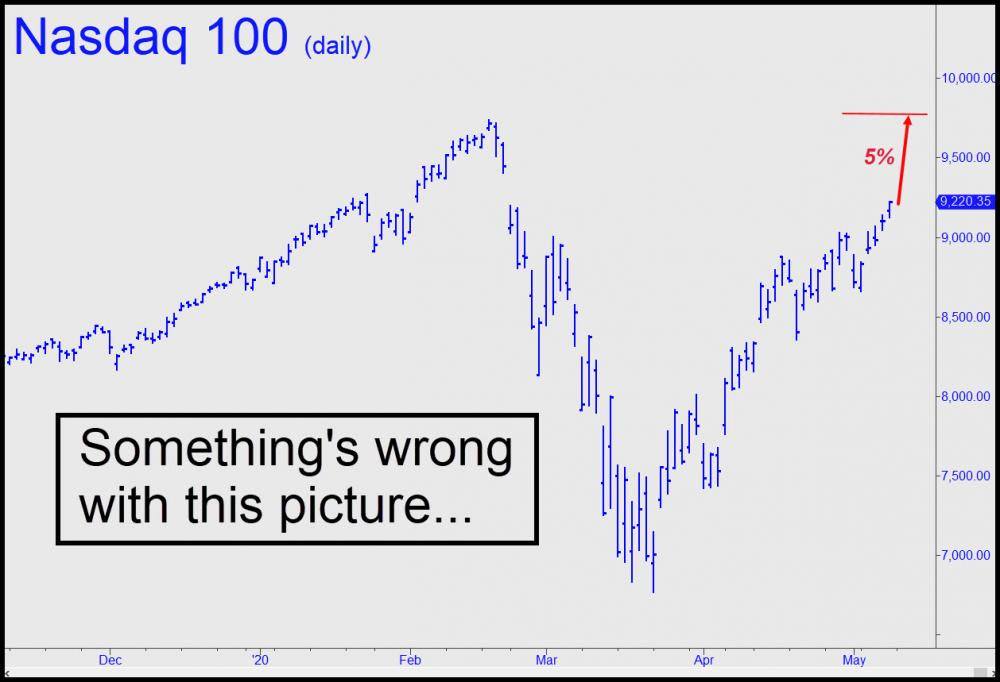Those who have closely observed the stock market's ups and downs over many years understand that it often acts as though it were detached from observable reality. This is so obvious at the moment that even casual market-watchers have come to realize that the absurdly strong performance of shares lately reflects nothing less a kind of mass mental illness. Until recently, so strong a characterization would have been greeted with skepticism by those who are not tuned to the daily histrionics of shares. Think of the skeptics as the extended family of a fictional Aunt Jean, whose behavior, according to family gossip, has grown a little strange lately. She has always seemed a little eccentric, of course, and why should we worry if she has become a little moreso in her dotage? And then the shocker: With everyone seated around the Thanksgiving dinner table, Aunt Jean wrenches the carving knife from her brother's hands, stabs the turkey ten times, and shrieks "Death to the Paraclete!"
This, in a manner of speaking, is the way the stock market has been acting lately. As such, it is no longer regarded as quaintly crazy. Indeed, even Wall Street's most reliable shills and apologists have taken to shaking their heads in disbelief. Some, including the Wall Street Journal, are in calculated denial. A WSJ headline over the weekend noted that the Smallest U.S. Stocks Are Rallying Despite Grim Economic Data. However, this fails to capture the alarming recklessness pushing the very largest U.S. stocks, including Apple, Amazon and Google, toward or even above their previous highs. TSLA in particular has stoked the white-hot imagination of the lunatic fringe with a rally from 350 to 869 that recently brought the stock within 10 percent of all-time highs. Even the company's founder, Elon Musk, has warned buyers to cool it.
Not Mere Tulipmania
Realize that the market's cheerleaders possess no special knowledge that would allow them to claim, as Larry Kudlow did last week, that a 'spectacular' 2021 lies in store for the economy. In point of fact, the unique thing about this recession is that because each and every one of us is being affected by it, we can see through the fatuousness of those who would claim Americans will soon start spending their way out of an economic hole as deep as the one we faced as 1930 began. Given the circumstances, it would take a miracle to produce a U-shaped recovery, never mind V-shaped. The way things are going, actually, we may soon discover that the best we can hope for is to pull even with the trough of the recessions in 1973-74 and 2007-08. The rally on Wall Street is different from previous speculative manias in one interesting respect: Stocks are not at record levels (at least not yet), but somewhat below them. Even so, this is not merely a variation of Tulipmania we are witnessing, or of the South Sea Bubble , but rather a welling up of irrationality that in dollar terms, even after adjusting for inflation, dwarfs both episodes.
The mainstream narrative is that stocks are moving higher because investors believe we've hit bottom and are looking ahead. Far more convincing is a confluence of factors, to wit: 1) institutional investors and Baby Boomers are sitting tight for now. They were not spooked out of their shares at the March 23 low, although another day or two of hard selling could easily have triggered a full-blown stampede by the latter; 2) bears have been shorting the rally every inch of the way and are being forced to cover their positions with each new upthrust. This has supplied a powerful and urgent source of buying that has only increased as stocks have climbed; and, 3) portfolio managers, while eager to unload stocks, are smart enough to realize that dumping them would be self-defeating; and so they continue to distribute as many shares as they can with a light, deft touch.
Big Spenders Kayoed
The bullish story, such as it is, flouts an economic fact that will remain insurmountable for the foreseeable future -- i.e., most discretionary income is in the hands of older people who are not about to rush out and spend it, especially when the value of their assets is being decimated by the pandemic. Here is my colleague Charles Hugh Smith on Why Assets Will Crash: "The top 10% own roughly 85% of all non-family-home assets (i.e. stocks, bonds, business equity, rental real estate), [and so] the decline in the value of these assets and the decline in the income generated by these assets will hit the top 10%, not the bottom 90% who own a tiny sliver of these assets." Concerning the wealthiest, he notes in a recent email to subscribers, they account for "about half of all consumer spending, and these are the households that will be most affected by the sharp drop in assets, small business income and the shrinking of heretofore 'safe' white-collar jobs in higher education, healthcare, finance, etc." Smith further notes that the aging owners of wealth "are more at risk of Covid-19 than younger people. Surveys have found that people who feel more at risk are much less inclined to start going back to restaurants, musical events, etc., or going on cruises or airline flights."
Bottom line: The stock market has nothing to celebrate right now. Trust your instincts on this and steer clear of it, since the next leg down is going to be lie no other before it.
"correct" - Google News
May 11, 2020 at 06:13AM
https://ift.tt/3fEYZJA
You Are Correct: The market is mentally iIll - FXStreet
"correct" - Google News
https://ift.tt/3d10rUK
https://ift.tt/35qAk7d
Bagikan Berita Ini















0 Response to "You Are Correct: The market is mentally iIll - FXStreet"
Post a Comment